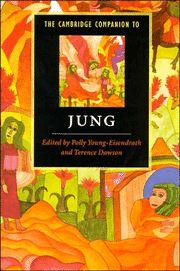Book contents
- Frontmatter
- Introduction
- Part 1 Jung's ideas and their context
- Part 2 Analytical psychology in practice
- Part 3 Analytical psychology in society
- 11 Gender and contrasexuality
- 12 A Jungian analysis of Homer's Odysseus
- 13 Jung, literature, and literary criticism
- 14 Jung and politics
- 15 Jung and religion
- Glossary
- Index
- References
15 - Jung and religion
the opposing Self
from Part 3 - Analytical psychology in society
Published online by Cambridge University Press: 28 May 2006
- Frontmatter
- Introduction
- Part 1 Jung's ideas and their context
- Part 2 Analytical psychology in practice
- Part 3 Analytical psychology in society
- 11 Gender and contrasexuality
- 12 A Jungian analysis of Homer's Odysseus
- 13 Jung, literature, and literary criticism
- 14 Jung and politics
- 15 Jung and religion
- Glossary
- Index
- References
Summary
Why Jung on religion?
How are we to respond to the twentieth-century phenomenon, which Jung noted with such alarm: that the collective containers of religious symbolism are weak, if not altogether gone? For centuries the symbols, rituals, and dogmas of religions, East and West, gathered the psychic energy of individuals and nations alike into traditions that bore witness to life's meaning and acted as underground springs nourishing different civilizations. Jung saw our century as one no longer in daily touch with the meaning of being which lies at the center of life. We have plumbed the resources of consciousness as best we could in our efforts to fathom and to control the contradictions and paradoxes of spirit that have remained to us, but we have lost touch with our roots and the symbolic life that they support and nourish.
Where are we now? What has happened to all the energy that is no longer channeled into religious containers? According to Jung, it has poured back into the human psyche with disastrous effect. Deprived of its proper outlet in religious experience, it assumes negative forms. For the individual, this misplaced energy can lead to neurosis or psychosis; in society, it can lead to all kinds of horrors, genocide, holocaust, and gulags. It can give rise to ideologies whose potential good is soured by the bullying of adherents into frightened compliance. Afraid of being swamped, we erect barriers of rigid rules and compartments against the negative barrages of psychic energy, creating religious, political, and sexual fundamentalisms that trap us in unyielding certainties.
- Type
- Chapter
- Information
- The Cambridge Companion to Jung , pp. 296 - 313Publisher: Cambridge University PressPrint publication year: 1997
References
- 1
- Cited by



